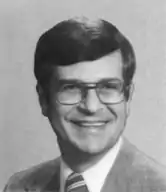| |||||||||||||||||
| |||||||||||||||||
 County results Lott: 50–60% 60–70% 70–80% Dowdy: 50–60% 60–70% 70–80% 80–90% | |||||||||||||||||
| |||||||||||||||||
| Elections in Mississippi |
|---|
.svg.png.webp) |
The 1988 United States Senate election in Mississippi was held on November 8, 1988. Incumbent Democratic U.S. Senator John C. Stennis decided to retire instead of seeking a seventh full term. Republican Trent Lott won the open seat, becoming the first of his party to win this seat since 1874.
This was the first time since the end of Reconstruction that Mississippi had two Republican senators serving concurrently.[1]
Democratic primary
Candidates
- Wayne Dowdy, U.S. Representative from McComb since 1981
- Dick Molpus, Secretary of State of Mississippi
- Gilbert Fountain, Biloxi pipefitter
Dean Pittman managed Dowdy's campaign.[2]
During the campaign Molpus criticized Dowdy for his low voting attendance of 68 percent, a line of rhetoric which was later used by Republican nominee Trent Lott in the general election.[2]
Results
| Party | Candidate | Votes | % | |
|---|---|---|---|---|
| Democratic | Wayne Dowdy | 189,954 | 53.46% | |
| Democratic | Dick Molpus | 152,126 | 42.81% | |
| Democratic | Gilbert Fountain | 13,276 | 3.74% | |
| Total votes | 355,356 | 100% | ||
Republican primary
Candidates
- Trent Lott, U.S. Representative from Pascagoula since 1973, House Minority Whip since 1981
General
During Lott's tenure in the U.S. House of Representatives he opposed the Comprehensive Anti-Apartheid Act, Civil Rights Restoration Act of 1987, and the creation of Martin Luther King Jr. Day while Dowdy supported those bills. Robert Goodman, who Bill Minor named Dr. Feelgood for being able to portray candidates positively, was hired by Lott's campaign to create advertisements in anticipation to attacks on his voting record by Dowdy. Lott voted in favor of cutting Social Security spending while Dowdy voted against, but Lott argued that he was more likely to support Social Security as his mother lived off of it while Dowdy's family was worth $60 million.[4]
Blacks for Trent Lott was formed by Isadora Hyde and Cleve McDowell, a former field director for the NAACP in the Delta region, worked for Lott's campaign. Dowdy's campaign criticized Lott for only having hired two black people out of the 163 people he had hired since 1972. Lott claimed that he hired many black workers, but "I don't keep count" and later claimed he hired five or six black workers.[5]
Country musician Mel Tillis made radio ads for him targeted at rural areas in northern Mississippi.[6] Dowdy received 87% of the black vote.[7]
Polling
| Poll source | Date(s) administered |
Sample size |
Margin of error |
Trent Lott Republican |
Wayne Dowdy Democratic |
Other / Undecided |
|---|---|---|---|---|---|---|
| The Clarion-Ledger/WLOX[8][9] | October 31 – November 2, 1988 | 817 LV | ±3.5% | 48% | 34% | 18% |
Endorsements
- Municipal officials
- Charles Evers, mayor of Fayette, Mississippi (1969–1981; 1985–1989)[10]
- Newspapers
- Newspapers
Results
| Party | Candidate | Votes | % | |||
|---|---|---|---|---|---|---|
| Republican | Trent Lott | 510,380 | 53.9% | |||
| Democratic | Wayne Dowdy | 436,339 | 46.1% | |||
| Total votes | 946,719 | 100.0% | ||||
| Republican gain from Democratic | ||||||
See also
References
- ↑ Moreland, Steed & Baker 1991, p. 96.
- 1 2 Moreland, Steed & Baker 1991, p. 103.
- ↑ "MS US Senate - D Primary". Our Campaigns. Retrieved July 12, 2018.
- ↑ Moreland, Steed & Baker 1991, p. 102.
- ↑ Moreland, Steed & Baker 1991, p. 104-105.
- ↑ Moreland, Steed & Baker 1991, p. 105.
- ↑ Black & Black 1992, p. 356.
- 1 2 3 Moreland, Steed & Baker 1991, p. 106.
- ↑ "Bush, Lott way out front in statewide polls". The Clarion-Ledger. November 6, 1988. p. 1A. Archived from the original on August 2, 2023 – via Newspapers.com.
- ↑ Moreland, Steed & Baker 1991, p. 104.
- ↑ "MS US Senate". Our Campaigns. Retrieved May 17, 2019.
Works cited
- Black, Earl; Black, Merle (1992). The Vital South: How Presidents Are Elected. Harvard University Press. ISBN 0674941306.
- Moreland, Laurence; Steed, Robert; Baker, Tod, eds. (1991). The 1988 Presidential Election in the South: Continuity Amidst Change in Southern Party Politics. Praeger Publishers. ISBN 0275931455.

